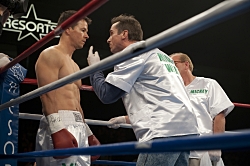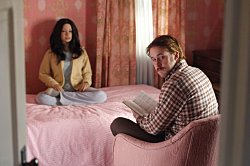Interview With Milt Bearden (CIA Consultant)
 Interview With Matt Damon (Edward Wilson)
Interview With Matt Damon (Edward Wilson)
 Interview With Robert De Niro (Bill Sullivan, Director, Producer)
Interview With Robert De Niro (Bill Sullivan, Director, Producer)
 Interview With Angelina Jolie (Clover Russell)
Interview With Angelina Jolie (Clover Russell)
 Interview With Eric Roth (Screenwriter)
Interview With Eric Roth (Screenwriter)
 Interview With John Turturro (Ray Brocco)
Interview With John Turturro (Ray Brocco)
Popular on LondonNet
 Milt Bearden served in the CIA for 30 years, culminating in a stint overseeing the Soviet-East European Division of the CIA’s Operations Directorate and then working as the CIA Chief in Bonn. He is the author of The Black Tulip: A Novel of a war in Afghanistan, and is a regular contributor to The New York Times and The Wall Street Journal. He worked with Robert De Niro on Meet The Parents and the two have become good friends. He acted as the CIA technical advisor on The Good Shepherd.
Milt Bearden served in the CIA for 30 years, culminating in a stint overseeing the Soviet-East European Division of the CIA’s Operations Directorate and then working as the CIA Chief in Bonn. He is the author of The Black Tulip: A Novel of a war in Afghanistan, and is a regular contributor to The New York Times and The Wall Street Journal. He worked with Robert De Niro on Meet The Parents and the two have become good friends. He acted as the CIA technical advisor on The Good Shepherd.
Do you believe this film could have been made were it not for 9/11 and the extra interest in the Agency during the Iraq War?
The concept started well before that, but that’s an interesting question. I’m not sure where the bearing with 9/11 would come in. There’s no control in the States, and you can make a film about anything you want to. Would it be something that would be as interesting as I think it’s going to be to the public? I’m not sure, but the public worldwide has, so far, been sent on a wild goose chase when it comes to the spy world. There are some wonderfully entertaining movies out there which, in reality, have nothing to do with the spy world. Like the currently successful James Bond movie. I joined the CIA just as the first Bond films came out with Sean Connery. All those are great fun but have nothing to do with anything. But this film was something that De Niro was going to do and he was going to make it real. And he really captured that.
Would you say this is the most authentic spy movie to date?
You can take pieces of this film, take this contest between the KGB officer and the Matt Damon character and you’ve got woven in there one of the most sophisticated tales of agents targeting each other and their attempts to compromise. It’s up and down, kind of like a match that keeps changing, until the end and… then you’re still not sure. Although I would always warn you that, to use the baseball term “Edward Wilson always bats last.” So yes, nobody has ever done a film as sophisticated as that. It’s very close to some of things I’ve seen over the years, and I’ve seen a great many things. This all came out of Eric’s mind and he’d ask me “Would you say it this way or that way?”
Was Eric’s reference to you primarily about the emotional impact of the operative rather than actual factual detail, which presumably he could glean more easily?
Yeah. You know, this film will take you where you haven’t been before. You think as a film person you’ve been almost everywhere. We’re taking you inside a guy who starts off as any other brilliant kid that comes to Yale and goes into Skull & Bones. You watch and go through this stuff and the Matt Damon character is a composite of real people. They’re all dead but De Niro was able to use the sons and daughters of his subjects to get inside this group, the way they were and the way they owned America. America really was run by the Oxbridge crowd, Andover, Yale. We don’t have that anymore.
How were you were recruited into the CIA ?
I had been in the airforce and had a come back and was working on my PhD. In those years you had professors all around the country from the American educational establishment who were friendly to the America Incorporated school and they would spot somebody and tell the CIA to give that guy a call. They would take a look at him. As soon as they asked me if I’d like to travel the world and serve my country I said “get me out of here,” and I never looked back.
A big part of this film looks at the problems operatives have trying to maintain a happy marriage. Yet I understand you’re happily married?
I’ve been happily married now for 29 years but I have an ex wife too! I contend that the divorce rate in the clandestine services was probably greater than elsewhere in America, the publishing world, the film world or any other high pressure worlds. But you could argue that we had a huge amount of personal problems.
If I’ve had a hard day I go home and unload on my girlfriend, what does a CIA guy do? Does it just build up inside and eat away at him or her?
You’re in a situation where you take your complete identity and put it in a cardboard box. Everything is new, your passport, your driving licence, your credit cards, your library card, pictures of kids or no kids, your dog. Then you become that person and disappear for some period of time. You don’t come home and talk about that. I wouldn’t want anybody to go away from this film and say that every CIA marriage is doomed. You’ve got to understand the energy of the female character played by Angelina Jolie. She was a beautiful, pampered senator’s daughter married to this perfect husband, who then becomes a dry goods exporter, as far as his story goes. She then becomes nothing. She would have been a wonderful society wife, and much happier as the wife of the under secretary of state. But Angelina is terrific. And look at Matt, look what he did.
One of the most memorable sequences was the torture scene. The person being interrogated points out to us that perhaps Russia wasn’t as big a threat as the CIA maintained. Was that true?
Could be. Every single thing in this film is based on something true. It’s fictionalized and made into a movie, a metaphor. I think if you make a metaphor out of the truth sometimes it contains more truth than the absolute truth. There were two Russians, Golitsin, the first, came and defected to James Angleton at the CIA. And we thought there was going to be a master plot for the Soviet Union to take on the world. Then comes Yuri Nosenko. Nosenko did not necessarily get beaten up but he was put into solitary confinement and that was big black mark on the CIA. So bring it all together and put it in a metaphorical impression of what happened and you get the truth shown in the movie. There was a debate about the threat that the Soviet Union really posed and the truth is that kind of risk assessment never really got documented. Part of the reason was that there were 30,000 war heads in the Soviet Union that would go down range if you lit the fuse.
What do you mean by “down range?”
If you go “down range” they would light off and go where they’re supposed to go. Do I contend that the Soviet Union was as big as the military industrial complex of America and the UK. No.
Do you think West found it easier to cope with one big tangible threat like Russia rather than now, where don’t have a seen enemy?
The set piece of the fifty year cold war was pretty simple. It was us and them. The shirts and the skins. That wasn’t something terribly hard to deal with. It was something that two or three generations of Americans who came through this city of Washington were able to understand and say, “This is easy to deal with.” After 1991, then we’ve got this world out there that’s been described by directors of Central Intelligence as no longer one big dragon in front of his lair, but we have a rain forest full of vipers. Well, we’ve been at that now long enough to where I think we should stop for a moment and say, “What is it?” “Where do we want to go?” Do we want to have what is being proclaimed by fundamentalist Islam as a great clash of the Judeo-Christian world against Islam? That’s not a goal of ours. Everything we do now, has consequences that are infinitely heavier. One big dragon at the mouth of the cave is infinitely more manageable than a forest full of vipers.
Am I straying to far from the movie to ask where you think Middle Eastern animosity towards America really stems from?
It certainly doesn’t come from one or two of the things that people point to – from the Afghans, from beating the USSR in Afghanistan. They didn’t say “We can now beat the USA.” We can go back at least to Paris in 1919, or back to Richard of Lionheart. But the reality is that it comes from the break up of the Ottoman Empire and the consistent humiliation of the Middle East by the West. There were high points of humiliation in the ’67 war and also from the unconditional love for Israel from the USA. We let them go to far.
Did you feel as though Syriana captured the essence of life as an agent?
It is only one of a couple of movies that captured a legitimate complaint, but it didn’t capture my heartbeat. Nor did it capture the world’s heartbeat but it quite discreetly presented a case, and you began to understand who the kids were that blew up the tanker. Nobody had done this before because we demonize our adversaries so much, they’re not even human. But that was the success of that movie.





